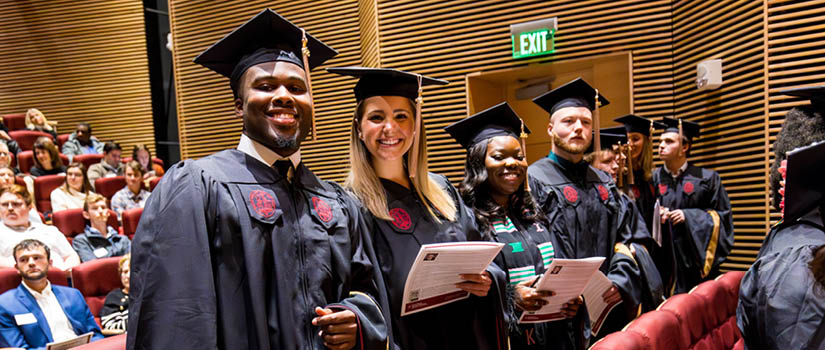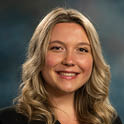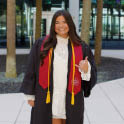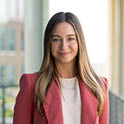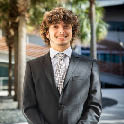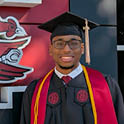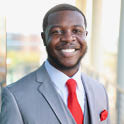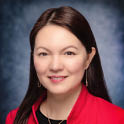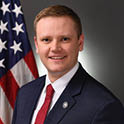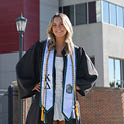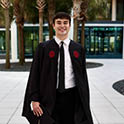Congratulations!
Congratulations to the Darla Moore School of Business December 2024 graduates! We are so proud of your accomplishments and wish you a bright future! Learn more about some of our graduates and their stories.
Undergraduate Student Stories
Formula for success
Graduate channels professionalism into leadership and career readiness
For Hannah Augsbach Lamma, ’24 accounting and international business and ’24 MACC , professionalism has been the cornerstone of her success. From managing a $250,000 budget as student body treasurer to excelling in internships at PwC and Elliott Davis, Lamma has consistently leveraged her professionalism to navigate challenges, build connections and prepare for her career in accounting.
“There are so many opportunities to network and speak professionally at the Moore School, which makes a big difference when you enter your first job,” Lamma said. “If you are uncomfortable networking and acting professionally, it makes internships a lot harder.”
Lamma’s focus on professionalism began when she chose the Darla Moore School of Business.
“I was looking for a strong business program, and I had grown up a Gamecock fan,” she says. “However, my campus visit was what really sold me. Everyone I met seemed genuinely happy to be there, and I loved the atmosphere of the Moore School building and campus as a whole.”
Her coursework and professors further reinforced the value of professionalism.
“Accounting faculty Bryan Stikeleather, Laura Self and Tim Baker are all really passionate about their subjects, and you can tell,” she says. “This made their classes super engaging, which always had the most significant impact on my understanding.”
Lamma’s internships at PwC and Elliott Davis allowed her to apply these lessons in real-world scenarios.
“The Moore School does a great job at preparing us professionally for internships,” she says. “It was very rare that someone in my internship would expect me to recall advanced accounting knowledge, but it was very common for them to have me write a professional email, draft a memo or clean up Excel sheets with little guidance.
“Even though those tasks sound simple, you can distinguish yourself by being independent and competent in those scenarios, which the Moore School prepares you for.”
As student body treasurer, Lamma refined her financial oversight skills while applying lessons from her accounting classes.
“I learned a lot about keeping good records of money spent throughout the year,” she says. “We learn a lot about analyzing past budgets to create future ones in our classes, but that is very difficult to do when you don't have sufficient evidence to do so.”
“If you're keeping proper records and analyzing how your money moves, advocacy for changes in the budget also becomes much easier,” she added. “Those are the administrative logistics behind what we learn in class.”
Her leadership roles, including student body treasurer and involvement in organizations like Gamecock Consulting, have been defining moments in her college experience.
“Probably becoming student body treasurer is the accomplishment I’m most proud of,” she says. “That would not have been possible without my Moore School connections. Because I had leadership experiences, I knew the problems students were facing, and it greatly influenced my strategy.”
Looking back, Lamma considers professionalism the most valuable skill she’s developed at the Moore School.
“The ability to network, write professionally and communicate effectively is what sets you apart,” she says. “It’s the foundation for success in any internship or career.”
Her advice to new students reflects this mindset.
“Whenever you can, say yes to an opportunity because you never know where it will lead you,” she says. “Even if you're not certain at first, you never know where you'll find a new interest or connection.”
With a full-time audit position at PwC secured, Lamma plans to continue honing her professionalism and leadership skills.
“The Moore School has given me the tools to succeed,” she says. “I’m excited to take what I’ve learned and apply it in my career.”
-Madeline Murch
Understanding what makes clients tick
Graduate applies behavior insights to create meaningful content to connect with audiences
For Kamryn Bailey, ’24 marketing and psychology, marketing is about creating connections that last. Bailey leverages customer interactions to craft messages that resonate deeply with audiences.
“Marketing is not just about promoting a brand; it’s about understanding what makes people tick and connecting with them on a deeper level,” she says.
Bailey’s insight-driven approach was evident during her internship with The Cason Group, a consulting firm specializing in insurance and employee benefits.
She applied her understanding of psychology to develop social media posts and brand strategies that engaged her audience. Her most rewarding project was leading a two-month initiative to produce 12 animated videos about employee benefits.
“It was my first time having full creative control, which was both intimidating and thrilling,” Bailey says.
This experience pushed her out of her comfort zone and solidified her confidence in turning customer considerations into effective marketing.
Bailey credits the Moore School for giving her practical experience.
“The chance to work on real projects and get direct feedback from professors has been invaluable,” she says. “From creating a new marketing strategy to revitalize the American Girl brand to working with Buffalo Games and Puzzles to launch a new game concept with hopes of it reaching store shelves, my professors have been more than instructors—they’re mentors with real industry experience, invested in seeing me succeed.”
As she looks ahead, Bailey is drawn to roles that combine creativity and strategy, particularly in brand management or product marketing, hopefully in the Columbia and Charleston, South Carolina, areas.
“As I look ahead, I’m excited to have accepted a full-time job offer at McGuinn Homes, a home-building company, as a Marketing and Sales Assistant in West Columbia, South Carolina,” she says. “This role perfectly aligns with my passion for both marketing and sales, and I’m thrilled to become a part of a wonderful team that helps make homeownership dreams a reality.”
Her advice for students emphasizes the importance of hands-on experience.
“Internships help you discover your strengths, figure out what you like and build a network,” she says. “Don’t be afraid to put yourself out there — people genuinely want to help you, but you have to take the first step.”
For those beginning college, Bailey recommends diving into their internship search early.
“By starting your journey as early as freshman year, you’ll feel more confident and prepared to pursue your passions by graduation,” she says. “By the time I was applying for full-time roles, I already had three solid internships under my belt, each with unique experiences and skills to talk about.”
Bailey believes that having a strong foundation from these experiences will set students up for success in the future.
-Madeline Murch
Developing the mentality to ‘cast a wide net’
Graduate urges fellow students to ‘put themselves out there’ and take chances for
new opportunities
For Patrick Koon, ’24 international business and operations and supply chain, success is about venturing beyond what’s comfortable. Koon said he pushed his own boundaries, balancing challenging leadership roles with valuable internships over the course of his undergraduate career.
Koon’s decision to major in operations and supply chain was driven by a vision of making a tangible difference.
“I specifically pursued this degree due to the prevalence of supply chain issues in the wake of the COVID-19 pandemic,” he says. “Observing the impacts being made to people worldwide made me realize how I could not only have a global impact as a supply chain major, but I could also improve the lives of many.”
During his internship with EY last summer, Koon said he encountered firsthand the challenges of managing supply chains.
“In the facility where I was working, I was focused on standardizing troubleshooting procedures in order to create best practices and promote continuous improvement principles,” he says reflecting on the experience’s influence on his approach to operations.
Another pivotal experience came during Koon’s internship with Aurora Flight Sciences. There, he focused on improving production efficiency by analyzing machine center data and redesigning the materials storage layout to maximize space and streamline usage.
“This internship taught me to be prepared for the unexpected and prepared me for my career, because it oriented me with the typical manufacturing environment in the United States,” he says. “This allowed me to have an early understanding of the environment I would have to operate in a career, while highlighting how culture can affect manufacturing practices.”
Accompanying his real-world experience, Koon also developed his leadership skills on campus as vice president of education for Phi Chi Theta business fraternity and as a Student Government senator.
“This role helped me face complex problems because I was continuously navigating tense and legally complex situations,” he says.
The experience strengthened his public-speaking abilities and prepared him to tackle high-stakes scenarios with confidence.
Koon’s advice to students is to “cast a wide net.” He encourages students to embrace networking and internship opportunities.
“Submit that job application, send the LinkedIn message, because at the end of the day, you never know where it’ll take you,” he says.
Looking ahead, Koon plans to continue his journey with an accelerated Master of International Business degree at the Moore School and aims to further his knowledge of global trade and supply chain management.
“An ideal position for me in the next 5-10 years would focus on international manufacturing standardization within a multinational corporation, preferably in a managerial role,” he says. “This is because I am extremely interested in the way manufacturing is affected by location and culture, which requires specific adaptation and efforts to ensure standardization and quality.”
Koon’s goal is to make a lasting impact on supply chains worldwide, navigating complex business environments and understanding cultural dynamics to drive meaningful change.
-Madeline Murch
From classroom to insurance career
Graduate explores a career in underwriting by combining classroom knowledge with hands-on
industry experience
For Eric Locke, ’24 risk management and insurance, entering the insurance industry was inspired by family and solidified through firsthand experience. His initial interest began with his sister’s career, but it was his own work as an underwriting assistant at United States Liability Insurance (USLI) that set him on his path.
“My interest grew when I started a job as an underwriting assistant at USLI my sophomore year,” he says. “That’s where I gained firsthand experience handling policies and interacting with agents and underwriters.”
During his two-year role, Locke worked in personal lines, processing midterm endorsements and binding renewal policies.
“This taught me to be analytical and think within the company’s underwriting guidelines,” he says. “I learned a lot about the personal lines insurance industry, where I saw firsthand how risks such as inflation, catastrophes and COVID-19 affected pricing and capacity.”
Locke’s interest in risk management deepened thanks to professors like Robert Hartwig and Gregory Niehaus, whose passion for the field left a lasting impact.
“Their passion for risk management and the industry drew me even closer to the major,” he says.
Locke worked as a research assistant with the Risk and Uncertainty Management Center, where Hartwig is the director. Locke managed the center’s website, posting real-time insurance news and presentations from industry leaders.
“This helped me gain a better understanding of how economic conditions or world events affect insurance,” he says. “It showed me the importance of staying informed in a rapidly evolving industry like risk management and insurance.”
Outside of academics, Locke served as president of Gamma Iota Sigma, the professional fraternity for risk management and insurance. There, he developed skills in networking and leadership by planning events and coordinating with industry contacts.
“Through my involvement with Gamma Iota Sigma, I have developed my most important skill: networking,” he says. “Planning events, leading a team and building professional relationships are skills I believe will be essential in my career.”
Locke credits his time at the Moore School with giving him the practical and academic foundation he needed to step confidently into the workforce.
“The coursework, particularly in risk management and insurance, has equipped me with a strong foundation in understanding complex business concepts, such as corporate risk management and property and casualty insurance,” he says. “It’s been the perfect combination of theory and application.”
After graduation, Locke will join GenStar as an underwriting associate in commercial property in Chicago.
“I’m excited to apply everything I’ve learned from USLI, the Risk and Uncertainty Management Center, and Gamma Iota Sigma,” he says. “It’s an opportunity to grow my skills and dive deeper into the industry.”
For future students, Locke’s advice is simple: “Growth only happens when you step out of your comfort zone. Try everything that interests you, and don’t hesitate to ask questions — there are great professors here with a wealth of industry experience who truly want to see students succeed.”
-Madeline Murch
Learning to ‘understand the complexities of global markets
Graduate continuing international business journey with MIB program
For Kiersten McBride, ’24 finance and international business, challenges are opportunities for growth. From adapting during internships to developing leadership skills, McBride says she has learned to thrive under pressure.
“One of the biggest challenges I’ve faced was navigating uncertainty during my past internships, especially when working on projects outside my comfort zone,” says McBride, who was part of the IB Responsible International Leadership cohort. “Whether it was conducting due diligence on unfamiliar industries or preparing in-depth client presentations, I had to learn how to adapt quickly. These experiences taught me resilience, the importance of asking the right questions and how to manage ambiguity.”
Her focus on finance and international business has helped her understand the complexities of global markets and sharpen her analytical skills.
“Combining these two majors has given me a deeper appreciation for how interconnected global markets are and how financial strategies play a pivotal role in international operations,” she says.
During her internship with financial services company HSBC in Boston, McBride supported the Innovation Banking Team, working with health care startups.
“I worked primarily with health care clients, sitting in on client calls and conducting due diligence for the credit team, which was ultimately used to determine the loan rates and features based on the risk rating attributed by the credit officers,” she says.
One of her proudest moments came from analyzing venture capital trends for female-led startups.
“My findings highlighted the growing success of female CEOs in the startup space, and the analysis was later presented by my manager at a CEO Biotech Summit in California,” she says. “This project not only sharpened my analytical skills but also reinforced my passion for supporting innovation and diversity in business.”
On campus, McBride took on leadership roles that pushed her out of her comfort zone.
“When I started college, I was extremely reserved and introverted,” she says. Business fraternity “Alpha Kappa Psi taught me the importance of networking and the value of demonstrating curiosity through thoughtful questions.”
Her involvement in the Gamecock Consulting Club further developed her skills.
“Competing both domestically and internationally honed my presentation skills and equipped me with advanced PowerPoint and Excel skills,” she says. “Additionally, through leadership roles in both organizations, I’ve grown significantly as both a professional and an individual.”
Looking ahead, McBride has accepted a position in HSBC’s rotational analyst program.
“This program will allow me to develop my leadership skills and a comprehensive understanding of HSBC’s operations across the 50-plus countries where it operates,” she says.
Her long-term goal is to participate in HSBC’s International Manager Program, working in multiple countries and contributing to the company’s global operations.
“The International Manager Program would allow me to work in two different international locations over four years,” she says. “Ultimately, I aspire to leverage these experiences to contribute meaningfully to HSBC’s global operations.”
McBride encourages students to embrace challenges early and seek mentorship.
“Take advantage of the incredible resources available at the Moore School,” she says. “Don’t hesitate to seek mentorship — it can provide invaluable guidance. Lastly, if you have the chance, study abroad — it’s a life-changing experience that gives you a leg up in applying for international opportunities post grad.”
To further build on her leadership skills and enhance her overall understanding of the worldwide marketplace, McBride is enrolled in the Moore School’s accelerated Master of International Business program, which she will complete in 2025.
-Madeline Murch
‘Real growth comes from pushing yourself’
Graduating senior created his own opportunities for success
December graduate Sam Oppelt, ’24 accounting and operations and supply chain, assumed multiple roles above and beyond the average college student. Real estate investor. Improv actor. Fencing founder. From investing in real estate to help him pay for college to expanding the reach of student organizations, he pushed the boundaries to create new opportunities for himself and the groups he chose to lead.
"Coming to USC, I didn’t know exactly what 'business' meant, but I always knew I wanted to be in business," Oppelt says. "When I toured Darla Moore School of Business and learned that the operations and supply chain major was ranked No. 5 in the nation, it was a clear sign. The combination of world-class faculty, resources and the tactile nature of the program made it the perfect fit for me."
For him, success has never been solely about academics. Oppelt has fully embraced the multifaceted nature of university life, taking on leadership roles in extracurricular activities like Overreactors Improv Troupe, competing in the Gamecock Fencing Club and even managing a real estate investment in Columbia — all while balancing the financial challenges of being a self-funded student.
"Financing my own education has been one of the greatest challenges," he says. "I took on student loans, but I also invested in real estate — buying a home in Columbia and renting rooms to fellow students. It wasn’t easy, but the experience taught me a lot about responsibility and hard work."
The Moore School’s rigorous academic environment presented its own set of challenges, particularly when Oppelt found himself initially struggling with accounting fundamentals. It was through these struggles that he discovered a deep appreciation for the discipline.
"My professors were incredible," he says. "Chris Glenski, Brian Stikeleather and others helped me see accounting not just as a profession, but also as a powerful tool that shapes the world’s financial systems. I went from finding accounting intimidating to understanding its importance and relevance on a global scale."
This understanding of the profession was further reinforced when Oppelt took part in the prestigious PwC Challenge Case competition during his sophomore year. PwC is a professional service firm offering various professional resources. He and his team focused on helping a rapidly expanding company improve its IT infrastructure and data governance.
"Our team was the only one to suggest a solution related to data governance," Oppelt says. "The judges said we 'nailed it.' One of those judges, Jesse Bachman, is now my future boss at PwC, where I’ve accepted a full-time position in their Digital Assurance and Transparency practice."
Oppelt’s leadership experience goes beyond the classroom. As president of the Overreactors Improv Troupe, he applied his accounting skills to take the student organization to new heights. By implementing structured financial systems, introducing creative marketing strategies and even expanding their performances to new venues, Oppelt helped the troupe achieve a 33 percent increase in show revenue and a nearly 50 percent increase in attendance.
"We treated it like a business," he says, "and the results spoke for themselves. It’s not just about numbers; it’s about bringing structure and creativity together."
This balance between creativity and structure is a theme that runs through much of Oppelt’s college career. As a founding member of the Gamecock Fencing Club, he also found time to pursue athletic passions. His contributions to the growing trophy collection of the Gamecock Fencing Club, which now competes as a university sports team, reflect his desire to bring people together and create something profound.
For Oppelt, he said none of this would have been possible without the support of his family and peers. He credits his parents for instilling in him the drive to succeed and his close-knit group of friends for pushing him through challenging times.
"My best friend, Sanford Cox Graves II, has been with me through everything — from cross-country runs to late-night study sessions," Oppelt says. "To have a best friend who always has your back is an incredible gift. We’re walking across the stage together, and it’s a full-circle moment for both of us."
As Oppelt prepares for his next chapter at PwC, he is also focused on his future goals, including passing the CPA exam and contributing to his community. Looking forward to a long career in accounting, Oppelt is eager to use his expertise not just for corporate growth but to give back to the place that helped shape him.
"Whether it’s through my work at PwC or investing in small businesses in the community, I want to continue to grow and find ways to make a difference," he says. "I’ve always believed in the power of local businesses, and I’m excited to see where this journey takes me."
Reflecting on his journey, Oppelt has some advice for the next generation of Moore School students.
"Don’t be afraid of the challenges you face in school," he says. "It’s easy to take the path of least resistance, but the real growth comes from pushing yourself. The professors here are preparing you for the real world, and the adversity you face will shape you into the professional you’re meant to be."
Oppelt sees himself not only advancing in his career but also returning to South Carolina to contribute to the growth of local businesses and help others pursue their own entrepreneurial dreams.
"I’ve learned that the road to success is never finished," he says. "It’s constantly evolving. Like any good auditor will tell you, what we did last year will probably be what we do next year, but we build on it every time."
-Christian Osborne
Rising to success
Operations and supply chain graduate builds international business skills while fulfilling
his Gamecock destiny
For many students, the road to graduation is filled with challenges, triumphs and the occasional unexpected turn. For Alex Outen, ’24 operations and supply chain and Business Analytics Undergraduate Concentration, the journey has been one of perseverance, professional growth and a relentless drive to make a meaningful impact in the business world.
A Columbia, South Carolina, native, Outen’s journey to the Moore School could be considered almost preordained.
“I’ve been a Gamecock fan all my life,” Outen says. “Becoming part of the USC family was a dream come true.”
To realize his Gamecock dream, he was intentional about building genuine connections and making a difference in the community.
Outen familiarized himself with resources that would provide academic support and create a sense of belonging. That’s when he discovered the Rising Scholars program, which provides mentorship, career guidance and community-building for underrepresented students at the Moore School.
“I first learned about Rising Scholars in high school and knew it was a program I wanted to join,” Outen says. “The opportunity to connect with like-minded students from across South Carolina was something I didn’t want to pass up.”
The Moore School’s diverse demographic and experiences added another layer of assurance for him.
“The Darla Moore School of Business has prepared me for the future in ways I couldn’t have imagined,” Outen said “It’s a place where you can explore diverse opportunities and rise to meet business challenges in a global environment.”
He credits his community as a whole, but especially the Rising Scholars program, for being more than just a support system — for also being “a family.”
“The Rising Scholars community helped me build confidence as I stepped onto campus for the first time,” Outen says. “Through study groups, academic advising and mentorship, I gained not only academic knowledge but also essential professional skills.”
In addition to the strong academic foundation provided by the Moore School and Rising Scholars, he took full advantage of opportunities to gain practical experience through internships and study abroad programs. One standout experience was a summer internship with Dell Technologies in Austin, Texas.
“The internship allowed me to apply what I had learned in the classroom to real-world supply chain projects,” Outen said. “It was incredible to see how large, global companies like Dell manage their supply chain operations and make a tangible impact on their partners.”
He also had the opportunity to broaden his international perspective with a study abroad program in Athens, Greece — his first time out of the United States.
“That experience opened my eyes to the complexities of international business,” Outen said. “I learned how different cultures approach business and the challenges companies face when expanding globally.”
In a true full-circle moment, today, he was able to give back to the program he credits for getting him this far — the Rising Scholars. As a mentor to incoming students, he shares his firsthand insights on the impact of networking and academic success.
“First-generation, underrepresented students need to have a support system,” Outen said. “I’m proud to be part of a program that ensures no student feels alone in their college journey.”
When predicting his life ahead, his goals include a career in business operations, supply chain management or analytics.
“In the next five years, I see myself working for a global company, making a positive impact on people, processes and the environment,” Outen says.
He is currently a corporate management career prep fellow at Management Leadership for Tomorrow, a nonprofit organization based in Bethesda, Maryland, and is looking for full-time opportunities.
-Christian Osborne
Graduate Student Stories

A 'strategic investment' in her future
Graduate shares what made the program ideal for her career path
Faith plays a pivotal role in ’24 fall graduate Rebekah “Bekah” Anderson’s career. Originally from Birmingham, Alabama, she started her Gamecock journey by pursuing her undergraduate degree in international business and operations and supply chain. She credits her Christian faith as the catalyst for continuing her education that led her to the Master of International Business program.
While some may frown upon sharing their spiritual beliefs in professional settings, Anderson took a different stance. She said she doesn’t have a concrete plan for her career yet. Instead, she chooses to trust in her faith.
“As a professional, I am bold in my faith; I don’t shy away from who I am as a believer because so much of my identity stems from being a Christian,” she says.
Anderson said she pursued her MIB degree because she’s “always had a heart for the nations.”
“I didn’t always know that I wanted to get my MIB. I actually decided during my junior year at USC,” she says.
For Anderson, the accelerated MIB program felt like an ideal opportunity to capitalize on her undergraduate scholarships and gain a deeper understanding of global business.
While she admits that wasn’t a path she had planned from the start, she believes it’s the path God wanted her to take — dubbing her experiences as “a strategic investment” in her future.
“I know that there are spaces where people shy away from talking about their faith, and I am respectful of that, but for me, it always seems to just come up casually — I like to lean into that,” she says.
Finding community was a priority for Anderson as she recalls the initial transition from Birmingham, Alabama, to Columbia, South Carolina, as a mixed experience.
“The shift from high school to the independence of college life had its ups and downs; overall, it was a positive experience,” she says. “I quickly found a sense of community through my church and by getting involved with Young Life ministry, which made adjusting to life away from home much easier. Those connections were essential in helping me feel settled in Columbia.”
After developing her community and connections in Columbia, Anderson shifted her sights to her global network. Being an undergraduate international business major prepared her to broaden her global perspective, but she said she wanted to know more about specific disciplines.
“I wanted to continue to grow my global perspective on business, particularly in how operations and supply chains function on an international scale,” she says. “I was drawn to the program’s focus on cross-cultural competency, which is essential for anyone working in global business today. The curriculum’s real-world application and alignment with my career goals in supply chain management and international operations made it an easy choice.”
Through hands-on experiences and immersive courses, Anderson said she understands more specifically about the complexities of global business, while also admitting that through both her studies and connections, she’s tremendously expanded her network, too.
“The MIB program has given me a broader understanding of how international markets operate, as well as the complexities of managing businesses across cultures,” she says. “It’s helped me bridge theory and practice, especially through the client-based projects that allowed me to apply classroom knowledge to real-world business problems. The program has also enriched my professional life by expanding my network — I’ve built meaningful relationships with classmates from around the world.”
Anderson said she doesn’t believe that her academic path and adoration for building global connections happened by happenstance. While pursuing both her undergraduate degree and graduate degree, she reflects on her church mission trips overseas in Germany and North Africa.
“In addition to being a worship leader at RADIUS Church, I went on many mission trips overseas, helping establish various youth sports divisions. In my ministry, Youth Life, I worked closely with middle schoolers to provide mentorship and community,” she says.
While applying and searching for roles, Anderson has been intentional about looking at nonprofits and other organizations to continue her spiritual mission while marrying her academic and professional mission.
“I want to do more than save a company a couple of thousands of dollars — for me, it’s more important that I stay true to my mission of sharing the gospel through my work and at my work,” she says.
Anderson recently completed a co-op at Schaeffler as part of the Cost and Value Analysis team, working on sustainability initiatives, cost calculations, and data visualizations. While she enjoyed her time there, she said she is hoping to begin her career with a nonprofit company.
“Ideally, I would love to work with an organization where I could apply my background in international business and supply chain management to make a tangible difference in the world,” she says. “I’m driven by the desire to contribute to something meaningful and have a positive impact on communities globally. I don’t have a job lined up yet, but I’m excited to see where God takes me.”
-Christian Osborne
HR internship leads to full-time opportunity
MHR graduate credits program with launching his career with IBM
Michael Cribb, ’24 Master of Human Resources, chose the Moore School for his MHR degree for the program’s reputation and the positive experiences Cribb heard from other successful alumni.
Originally from Florence, South Carolina, Cribb has seamlessly transitioned from his undergraduate studies at Claflin University to pursuing his master’s. Since Claflin is a South Carolina Historically Black College and University, Cribb was awarded the New Rising Star Fellowship, a Moore School initiative that provides funding for HBCU students to pursue their graduate degrees at the Moore School and other USC schools and colleges.
When he arrived at the Moore School, Cribb quickly became an active participant in the academic and professional communities surrounding him.
“I’ve always been passionate about human resources, and I knew the MHR program at USC would provide me with the knowledge and connections I needed to succeed,” Cribb says. “The 16-month program is intense, but it’s designed to get you into the workforce quickly, and I’m excited to see that happening for me.”
Over the summer, he completed a successful internship as an HR talent intern at IBM in Armonk, New York. There, he led projects to develop performance expectations for key job roles covering 80 percent of the talent organization. The work involved creating performance metrics that aligned with the company’s global business objectives.
“The internship was a tremendous learning opportunity,” Cribb says. “It gave me hands-on experience in talent management and performance metrics. I was able to apply what I learned in the MHR program directly to real-world business challenges.”
Cribb’s internship earned him an offer to return to IBM in a full-time position as an HR Talent Management Professional. The offer, which includes a competitive six-figure salary, was extended after Cribb’s performance throughout the summer. He will begin his full-time role in January 2025.
His experience with IBM is just one of the ways the MHR program has enriched his professional life. Cribb credits the program for helping him develop a strategic mindset and deepening his understanding of global HR practices. Through the program, he feels that he has gained invaluable insights into how HR can align with broader company goals.
“I’m focused on becoming a strategic business partner,” Cribb says. “The MHR program has taught me how to build strong leadership skills and enhance my ability to influence at all levels of an organization. I’m more prepared than ever to take the next step in my career.”
Cribb’s ultimate goal is to become a Chief Human Resources Officer at a Fortune 500 company. He plans to leverage the skills and network he’s building at the Moore School and IBM to reach that goal.
The MHR program’s job placement rate, which is among the highest in the nation, was a key factor in Cribb’s decision to enroll at USC. With his recent offer from IBM, Cribb is already on his way to a successful career in human resources.
-Christian Osborne
Bridging the gap between technology and business
Graduate shares how the program helped her in — and out — of the classroom
When Huijuan Dai, ’24 PMBA, first arrived in the United States from China, she never imagined that her career would span continents, industries and even entire sectors of the economy. The Professional MBA program was where her career path gained momentum.
With a Ph.D. in material science from a British university, she spent years at General Electric’s Global Research Center in Schenectady, New York. Dai was then promoted to GE Renewable Energy’s Chief Technology Office in Greenville, South Carolina, managing cutting-edge projects to promote disruptive technology including additive manufacturing and digital transformation.
While there, Huijuan recognized a crucial gap: while her scientific expertise was vital, understanding the financial and business aspects of technology adoption was equally important.
“I’ve always believed that the best technology doesn’t automatically lead to the best product,” Dai says. “When it comes to innovation, you need to consider the whole picture — market strategy, supply chain and finance. I realized that to make the biggest impact, I needed to strengthen my business skills.”
In 2017, Dai took a major step toward bridging this gap by enrolling in the Moore School’s PMBA program.
“My colleagues at GE and my husband, who is a mechanical engineering professor at the University of South Carolina, recommended the program,” Dai says. “I saw it as an opportunity to not just advance my career but to also better understand how to align technology development with business strategy.”
While working with GE and pursuing her PMBA, Dai’s journey took another turn when she decided to take a leave of absence from the PMBA program to accept a leadership role at the U.S. Department of Energy. She became the supervisory program manager in the DOE’s Advanced Materials and Manufacturing Technology Office.
In her role, she oversees an annual budget of more than $80 million, which funds research, development and demonstration projects in advanced materials and manufacturing technologies, with a strong focus on the future of U.S. manufacturing competitiveness in energy sectors.
With a team of more than 20 professionals, including federal employees, fellows and contractors, Dai said her team drives initiatives that could transform materials and manufacturing for America’s energy future — her team’s work was a crucial part of accelerating the clean energy transition and secure U.S. leadership in manufacturing competitiveness and resiliency.
“It’s been an honor to contribute to the nation’s energy future,” Dai says. “But it’s also been a challenge because we’re trying to push new technologies into industries that are sometimes resistant to change. That’s why understanding both the technical and financial aspects of innovation is so important.”
She eventually returned to the PMBA program, inspired by the work she does at the DOE. She recognized that the PMBA program’s elective courses in Information Technology and Cybersecurity Management were directly aligned with the goals of her current work, driving the national strategy for smart manufacturing.
“Managing technology investments requires a deep understanding of how industries can digitalize and adopt new tools efficiently,” Dai says. “The PMBA program has given me the knowledge to ensure the technologies we’re supporting have the best chance for commercialization.”
Throughout her time in the PMBA program, Dai says one of the most valuable aspects was the opportunity to collaborate with a diverse cohort of professionals. Through group projects and networking events, her classmates, who came from industries such as banking, consulting and operations/supply chain, helped expand her perspective on the role of business in innovation.
“Working with people who have different backgrounds was a huge eye-opener,” Dai says. “It taught me that a successful business strategy is not just about having the best technology but about understanding how all the pieces — finance, operations and marketing — come together.”
For those considering the PMBA program, she offers practical advice: “Time management is key, especially if you have a full-time job. But the flexibility of the program allows you to go at your own pace. Take advantage of the networking opportunities and always try to learn from your peers. Everyone brings something unique to the table.”
In the next 5-10 years, Dai aspires to obtain a leading role in the U.S. manufacturing renaissance by developing transformative materials and advanced manufacturing technologies that support Industry 5.0 by collaborating with teams across government, academia and industry.
“As we move toward a more sustainable future, technology is going to play a huge role,” she says. “But to really make an impact, we need to understand the business side of innovation and how to integrate those technologies into the marketplace. That’s what makes a difference.”
-Christian Osborne
Finishing what he started
PMBA graduate grateful for ‘flexibility and support’ for military students
Steven Johnson, ’24 Professional MBA, frequently walked past the Moore School’s PMBA satellite campus during his time working for Wells Fargo in Uptown Charlotte, North Carolina, leading him to investigate the program.
“When I was working at Wells Fargo in Charlotte, I walked past the PMBA satellite campus and inquired about the program,” he says. “I chose the Darla Moore School of Business due to the cost, flexibility and program ranking.”
The USC Professional MBA program is ranked No. 1 in South Carolina and No. 19 nationwide among the best professional MBA programs, according to U.S. News & World Report.
Before enrolling in the PMBA program, Johnson, originally from Central Minnesota, was a reserve service member in the U.S. Air Force. Johnson originally relocated to Charlotte, North Carolina, to take a role as a compliance officer with Wells Fargo. After a year into his new position, he officially applied to the PMBA program.
“I always wanted to achieve an MBA after I had acquired further professional work experience in the U.S. Air Force and financial sector,” he says.
Though he may have made balancing his service and academics look seamless, in 2020, he briefly halted the PMBA program to return to the Air Force as full-time servicemember to build the Space Force Headquarters.
“Balancing my duties as a part-time service member was not too difficult at first,” he says. “However, in 2020 I was called to full-time service to support the build of the Space Force Headquarters in Washington D.C. where I took a two-year break in my PMBA studies to focus on building the new headquarters.”
Johnson shared that his experience building the headquarters was “fantastic.”
“I got to be a part of history working in the Pentagon to build a new military service headquarters which hadn’t been done since the creation of the Air Force 73 years ago,” he says. “The experience resulted in many unique opportunities, from directly interacting with top senior leaders and building foundational enterprise functions, to creating organizational teams and working through numerous strategic space or military challenges from 2020 to the present.”
Returning to the PMBA program after a two-year hiatus wasn’t difficult for Johnson. In fact, he says he was determined to finish what he had started.
“After I returned to civil service out of uniform, I was determined to complete what I had started back in 2019,” he says.
Johnson is graduating from the PMBA program in the fall 2024 with a specialization in finance. He also earned the Business Analytics Graduate Certificate.
“The PMBA program was exactly what a military-centric student in the South Carolina area should consider if they are interested in achieving a PMBA due to the flexibility and support the university has toward military students,” he says.
-Christian Osborne
From Orange County to Spartanburg and BMW
Graduate shares her journey from a coveted internship to a full-time position
For Morgan Messenger, ’24 MIB and ’24 international business and operations and supply chain, the road to her Master of International Business degree was destined as soon as she stepped foot on USC’s campus. In her case, virtual steps. Originally from Orange County, California, Messenger came to the USC in fall 2020.
Like many students, she faced the challenges of starting college during the COVID-19 pandemic, but the global health crisis didn’t stop her from pursuing her dream career. In fact, it motivated her.
"I started my freshman year at USC during the pandemic, so it was definitely a bit of an adjustment," Messenger says. "But one of the things I really loved about the Darla Moore School of Business, especially the international business program, was how it created this small community where I always felt like I knew someone, even in a school of 30,000 students."
Her decision to pursue the MIB program was solidified after attending an international business workshop during her sophomore year, where she first learned about the MIB program’s accelerated path. A unique, accelerated option offered at the Moore School, the MIB program allows students to graduate with both a master’s degree and a dual undergraduate degree in just four years. This caught Messenger’s attention early on.
"I’ve always wanted to continue my education, and the idea of completing both degrees in such a short time really appealed to me," she says. "I’ve always liked to challenge myself academically, and this was the perfect opportunity."
By the time Messenger completed her first MIB course, International Negotiations, she was certain she had made the right choice. The course, which balanced theory with real-world practice, was the first of many that would shape her academic experience.
"I had never learned so much and had so much fun in a class all at once," Messenger says. "That sense of excitement and learning has continued throughout my MIB courses. It’s been a perfect fit."
Her studies have already paid off in the form of a valuable internship with BMW. After completing her first semester in the MIB program, Messenger interned at BMW’s Spartanburg, South Carolina, plant, gaining hands-on experience in operations and supply chain management.
Her role at BMW was a perfect complement to her MIB coursework, which emphasizes not only international business but also technical skills like data analysis using programs such as R and Tableau. Messenger applied these skills during her internship and saw firsthand how global business theories translate into practice.
"I loved working at BMW and seeing the theories I learned in class come to life," she says. "It was incredible to witness how Germany’s corporate culture shapes the way BMW operates on a global scale."
BMW extended her an offer to join its two-year Professional Accelerated Cross-functional Experience leadership development program upon graduation. Starting in January 2025, she will rotate through three 8-month roles across different departments, including logistics, IT and assembly. The program will also include German language classes, which Messenger is excited to continue as part of her long-term goal of living and working in Germany.
"BMW is a dream company for me," Messenger says. "I’ve always wanted to work for a German company and eventually return to live in Germany. This program is a perfect fit for me to start that journey."
-Christian Osborne
A Gamecock's path to HR leadership
Graduate transforms HR leadership internship experience into job opportunity
Will Murray, ’24 MHR and ’19 management, will begin his human resources career a long way from his hometown of Newberry, South Carolina, about 40 minutes outside of Columbia. After he graduates in December, he will move in 2025 to Chicago for a human resources leadership and development program with the same pharmaceutical company where he interned during the MHR program.
When he moved to Columbia to pursue his undergraduate degree at USC in 2019, he says he was drawn to the city’s energy and the opportunity to grow both personally and professionally.
“I immediately fell in love with the city and the people I met here,” Murray says. “Five and a half years later, I will be flying to a new city, but I’ll always call Columbia home.”
Although he didn’t initially set out to pursue a graduate program, Murray’s academic path pivoted his senior year when one of his professors, Wanda Chaves, saw potential in him for the USC’s Master of Human Resources program. After being encouraged by Chaves and meeting with Mazen Aziz, the MHR program’s director, Murray decided to apply.
“I didn’t know I wanted to enroll in the MHR program at first,” Murray says. “But after meeting with Maz, my interest grew. I applied, interviewed, and now I’m a proud Gamecock in the program.”
Murray’s passion for people and business led him to choose the MHR program, which offered him the best of both worlds: the academic rigor he sought and the opportunity to gain practical work experience.
The connections he formed with the city and the people he met established his professional foundation for the next phase of his journey — an internship with AbbVie’s Pharmaceuticals Research & Development, where he supported the company’s Pharmacovigilance & Patient Safety, Epidemiology, and R&D Quality Assurance team. He quickly realized that the program’s curriculum had overprepared him for his role.
“I wanted to gain more experience before heading into the real world,” Murray says. “The MHR program gives you the chance to learn from industry professionals while also connecting you with major companies that are actively recruiting.”
For Murray, the program was a transformative experience, helping him develop not only technical HR knowledge but also the confidence to become a strategic partner to businesses. He said that human resources should bridge employee goals and company objectives, and the MHR program gave him the tools to achieve that vision.
“The MHR program equipped me with the knowledge to be an asset to any company,” Murray says. “HR should bring employee and business goals together, and I feel confident in my ability to do that as I move forward in my career.”
After graduation, Murray is taking his first steps into the professional world as a Human Resource Leadership Development Program candidate at AbbVie Pharmaceuticals. His three-year rotation program will give him hands-on experience in various areas, including Centers of Excellence, Talent, and Business Human Resources. His assignments will take him across different business units, both domestically and internationally, as he builds his expertise in global HR strategy.
“I’m excited about this opportunity,” Murray says. “AbbVie is a company with a mission I truly believe in, and this program will help me grow into a strong HR leader with a global perspective. My dream is to eventually become their director of business HR.”
-Christian Osborne
Q&As with undergraduate students
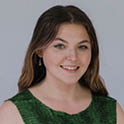
Why did you choose to attend the Moore School of Business? I have always been intrigued by traveling and learning about different cultures, and after finding out that this was the No. 1 undergraduate international business school, I wanted to take the opportunity to gain knowledge about global marketing and business strategies.
As an international business and marketing major with a French minor, how do you plan to integrate your language skills into your future career? I hope to use my French language skills while working abroad throughout my career, specifically international market expansion and development.
What motivated you to pursue a Master of International Business (MIB) degree, and what are your long-term career aspirations? I am so grateful for the opportunity to complete my MIB within the four years of my studies at USC. It is an incredible program that features both conceptual teachings and real-world applications. I would like to pursue a management career in the future, focusing on global market strategy.
Can you share more about your experience studying abroad in France? How did it shape your understanding of international business? At ESSEC, we concentrated on responsible international leadership, honing in on sustainable practices of corporations, completing a one-month field experience where we volunteered at social organizations in all different communities of need.
Could you tell us about some of the internships you've completed during your time at USC? What valuable lessons did you take away from those experiences? You’ve gained experience in diverse fields, from law to marketing and advertising. How have these different internships prepared you for your future career? My previous internships have been leadership-, communication- and marketing-based. In the summer 2023, I was selected to be the account manager of Fable Branding, a well-respected advertisement agency in Richmond, Virginia, with accounts including the Virginia Lottery, the Science Museum of Virginia and many others. I led a team of four interns and was accountable for communications between our personal client and our agency, gaining management and consulting experience. I recently worked at Quinn Law Centers as a summer intern. I have thoroughly enjoyed the opportunity to attend both virtual and on-site Virginia court hearings, depositions and client consultations. Taking extensive notes, I have gained a deeper understanding of the legal structure and the essential client-communication skills needed within the firm. I have also assisted the firm with making cold calls to recommended client agencies to discuss policy changes, establishing proficient customer service and phone communication skills.
You're actively involved in extracurricular activities like Cockappella, OFF OFF Broadway. How do you manage to balance these commitments with your academics and internships? Though I studied a more corporate-focused curriculum in international business and marketing, I love showing my creative and artistic side through my extracurriculars. One of my passions is performing and singing and I’m am thankful that USC has organizations to satisfy this hobby.
How does creativity play a role in both your extracurricular activities and your professional pursuits? Through theater and performing, I have learned critical public-speaking skills, which have helped me when managing teams in internships and presenting class consulting projects
What are your professional goals, and where do you see yourself in the next 5-10 years? In the next 5-10 years, I hope to acquire more marketing management positions, leading to my dream career of global marketing expansion and strategy.
As you prepare to graduate this December, what advice would you offer to fellow students looking to gain diverse field experiences like yours? Learn to be resilient. Remember that everything happens for a reason. It is a time of uncertainty when it comes to our future, but everything turns out OK in the end.
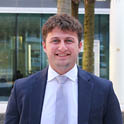
How did you first become interested in risk management and insurance, and what drew you to pursue it as a major? I originally intended to study finance, but my interest shifted to risk management and insurance because of the Academic Common Market. This program allows students from northern states to pay in-state tuition at South Carolina. It was an opportunity to explore a unique field that aligned with my interests while benefiting from a supportive academic environment.
What experiences during your undergraduate studies have most influenced your understanding of the insurance industry? I recently attended the TMPAA conference in Scottsdale, Arizona, where I learned about program insurance and how it’s reshaping the industry. The market is becoming more specialized — similar to how doctors now have specific areas of focus like knees or ears. In the insurance world, program space is doing something similar by tailoring solutions to niche markets.
What inspired you to launch a custom apparel company, and how has this entrepreneurial experience shaped your professional goals? I started a landscaping business in high school and missed the sense of ownership that comes with being an entrepreneur. The true meritocracy of entrepreneurship — where your success or failure is entirely up to you — was something I wanted to experience again. It’s inspiring to know that even menial tasks feel worthwhile because you directly reap the benefits. This has influenced me to seek careers where I can maintain independence and autonomy.
How did starting Carolina Cold Ones help you develop your business and leadership skills? Starting Carolina Cold Ones taught me the importance of understanding clients’ needs and positioning myself as a problem-solver. Many of my customers are breweries, which already have strong brands but lack merchandise. My approach involves reaching out with genuine enthusiasm, saying, “I love your brewery! I noticed you’re not selling merch yet. How about I create some free T-shirt designs for you? If you like them, we can move forward with production.” This strategy taught me that when your product genuinely benefits the customer, sales come naturally.
What challenges have you encountered while building Carolina Cold Ones, and how did you navigate them? Initially, I thought making money online would be easy, but I quickly realized it was more challenging than expected. My first plan to launch a custom clothing line wasn’t sustainable without a following, so I shifted to business to business sales. Convincing businesses to order 100 shirts proved far easier than selling to individual consumers. Along the way, I had to learn basic coding despite using e-commerce tools. I also learned to fail fast and cheap — testing demand before purchasing inventory saved me from costly mistakes.
How do you manage the demands of running a business while also focusing on your academic responsibilities? It’s difficult, but discipline is key. I stick to a consistent routine — waking up at the same time every day, going to the gym and minimizing distractions. For example, cutting down on phone usage freed up significant time for both schoolwork and my business. Time management and focus are essential.
Why did you choose the Moore School for your second degree, and how has it shaped your goals? I aspire to build a career that lets me explore the world, which is why I’m pursuing a Master in International Business. The Moore School’s MIB program is uniquely immersive — half the students are international, so every class and project becomes a global experience. I’m especially grateful to IB professor Tatiana Kostova, whose Maymester course was my first time abroad. Visiting different countries and engaging directly with senior leaders and entrepreneurs profoundly shifted my perspective. It taught me that every business is global to some degree and highlighted the importance of understanding different cultures — something I’m eager to continue learning about.
What do you hope to gain from pursuing am MIB, and how do you see it complementing your undergraduate education? My goal is to work in reinsurance or the excess and surplus side of the insurance industry. Many of the major firms in these areas are based in Europe, and the MIB program will provide me with the global perspective and advanced education needed to compete for these roles. In Europe, where higher education is often free, many of my peers will have advanced degrees. The MIB program will help me stay competitive while adding depth and focus to my undergraduate studies.
What advice would you give to prospective students considering the Darla Moore School of Business? Go for it! Seriously, the Moore School offers incredible opportunities. For instance, I recently interviewed for AB InBev’s GMT program, and among thousands of applicants, just 140 made it to the final round. Four other students from South Carolina were there with me, competing alongside candidates from top schools like MIT, Columbia and Georgia Tech. USC can give you the same opportunities as any of those institutions — it’s all about making the most of them.
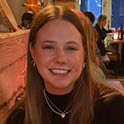
Why did you choose to attend the Moore School? I chose the Moore School because of their No. 1 undergraduate international business program and outstanding reputation. I also loved USC because of the school spirit I saw here and the atmosphere!
As an international business and management/entrepreneurship major, how do you plan to integrate both degrees into your future career? I plan to use my international business and entrepreneurial management knowledge in my future career through utilizing my IB experience in working for a global company and integrating my entrepreneurial knowledge when I hopefully start my own global business one day! I have also learned so much about management strategy that I hope to use in tandem with my global strategy knowledge in a consulting or management position.
What are your long-term career aspirations? My long-term career aspirations are to own a business and expand it abroad.
What did you find meaningful about your experience studying abroad in Belgium? How did it shape your understanding of international business? My experience in Belgium was so meaningful because I was able to fully integrate myself into the culture because I was there for five months. I also was able to meet so many people from so many cultures who I could learn from and build long-term friendships with! It shaped my understanding of international business because it helped me to gather real-world experience and see the culture differences for myself rather than just being in a classroom. It helped to reinforce learnings from my IB courses.
How has your experience abroad made you more likely to pursue your career in a different country? First, my experience abroad made me fall in love with Europe and traveling, which is a big reason I want to pursue a career abroad. But also, I love to work in a setting with many perspectives and where there is opportunity for learning — not just in business but also culturally. I think the opportunities are endless when you expand the scope of your career across the globe.
You're actively involved in extracurricular activities like Circle of Sisterhood, Alpha Xi Delta and private tutoring. How do you balance these commitments with your academics? I've managed extracurricular activities with school by making sure that I am motivated for them by only taking up extra activities that I am interested in and excited to pursue. I have also learned to be very organized and diligent with my time.
What are your professional goals, and where do you see yourself in the next 5-10 years? My professional goals are to complete the accelerated Master of International Business program that I have started and aim to complete in spring 2025 in the global strategy track. After that, I hope to get a job in global management consulting and work in Western Europe. In the next 5-10 years, I hope to start making moves towards creating my own business!
As you prepare to graduate this December, what advice would you offer to fellow students looking to gain diverse field experiences like yours? The advice I would give to students looking to gain experience like mine is to talk to those around them who have already done what they want to do and let them tell you why they enjoyed these things. I would also try your best to surround yourself with these same people who have the same goals and aspirations as you! Getting closer to those who are passionate about international business, traveling, entrepreneurship and just those who aim to grow personally has motivated me so much over the years.
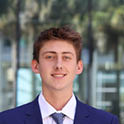
Why did you choose to pursue finance at the Darla Moore School of Business, and how has your experience here influenced your career goals? When I started at the Darla Moore School of Business as a freshman, I had very limited knowledge of finance. Initially, I thought it primarily involved becoming a financial advisor, working in banking or joining the finance department of a corporation. However, my perspective expanded significantly through conversations with professors during office hours, guidance from upperclassmen mentors and involvement in Moore School organizations. These experiences opened my eyes to the diverse opportunities within finance. I ultimately chose to pursue finance because of its steep learning curve and intellectually stimulating environment. I’m someone who gets bored easily, so the dynamic and ever-evolving nature of finance keeps me engaged. Having played sports my entire life, I also value the camaraderie of collaborating with others. Similarly, finance provides opportunities to learn from intelligent individuals and work alongside like-minded professionals to achieve common goals. Through the Gamecock Consulting Club and the Finance Scholars Program, I discovered my passion for financial consulting, particularly within restructuring. This field combines the technical expertise of traditional finance roles with problem-solving opportunities and exposure to management, creating an ideal balance between finance and consulting.
What initially sparked your interest in finance, and what motivated you to join the Carolina Finance Scholars Program? My curiosity about how businesses operate and make decisions initially sparked my interest in finance. As someone who aspires to own a business in the future, I was particularly interested in how finance contributes to growth and long-term success. I was motivated to join the Carolina Finance Scholars Program because of its emphasis on real-world application and the chance to learn through the case method. Additionally, I wanted to be part of a community of ambitious students driven to pursue high-trajectory careers in finance. Collaborating on case studies, supporting one another through recruitment and even living together during summer internships have helped me form strong connections and become very close with the other Scholars.
Could you describe your experience as a career consulting intern at Mercer? What skills
did you develop there that you feel will be valuable in your future career?
As a career consulting intern at Mercer, I worked on several projects focused on executive
compensation and job architecture. I gained valuable insights into how executive and
sales incentives influence company decisions and learned how to optimize incentive
structures to align with a client’s strategic goals. I also analyzed job architecture,
particularly evaluating job banding against industry standards. Over the summer, I
worked on six client projects, requiring efficient multitasking across teams and clients.
Each team had unique dynamics, so I adapted my communication style to meet specific
needs and preferences.
What were some of the biggest challenges you faced in your leadership roles with the
Gamecock Consulting Club, and how did you approach these challenges?
After joining the Gamecock Consulting Club in my sophomore year, I became director
of recruitment the following semester. This was challenging because I was still new
to the club and unfamiliar with its processes. To overcome this, I sought guidance
from other leadership members and relied on the internal team to learn what had worked
well in the past. While understanding the existing structure, I also introduced improvements,
such as making recruitment more inclusive across majors and adding a case competition
to better assess candidates and enhance their experience. Later, as VP of external
operations, I co-led the inaugural Darla Moore School of Business Case Competition,
transitioning it into a national event in partnership with McKinsey. I oversaw the
timeline and deliverables, coordinating with alumni, competitors, sponsors, judges
and other stakeholders. Initially, I wanted to handle every detail, but I quickly
learned the importance of delegation and trusting others to take ownership of specific
aspects. This allowed me to focus on project management and provide support where
needed most.
How has your involvement in various consulting and finance roles shaped your approach to problem-solving? My involvement in consulting and finance roles has taught me to approach problems with a structured framework, breaking down complex issues into manageable components. This method helps me understand the “why” behind deliverables and their broader context. As a result, I’ve been more proactive in anticipating next steps and providing value.
Reflecting on your journey so far, what is one of the most valuable lessons you’ve learned, and how do you think it will guide you in your career? One of the most valuable lessons I’ve learned is to find value in every task, no matter how small. For instance, while aligning invoices to purchase orders at Mercer, I used the opportunity to refine my Excel skills by mastering keyboard shortcuts. This taught me the importance of approaching every task with a growth mindset and seeking improvement in all areas.
What advice would you give to prospective students who are interested in finance and consulting? Mentorship and networking are essential. Coming from a non-business background, I relied on upperclassmen, faculty and alumni mentors to gain insights into opportunities at the Moore School and explore potential career paths. Networking is also key in competitive industries; it’s about building genuine relationships, learning from others and gaining clarity on what excites you — or doesn’t align with your interests. It’s also important to surround yourself with driven individuals who share similar ambitions. Joining the right circles, whether through student organizations, business fraternities or other activities, can provide a supportive community and lead to lifelong connections.
Where do you envision yourself in the next 5-10 years, and what impact do you hope to make in the finance and consulting industry? In the next 5-10 years, I hope to build a meaningful career in restructuring consulting, helping distressed companies navigate financial and operational challenges. This work aligns with my passion for problem-solving and provides exposure to complex business issues. After gaining experience, I plan to pursue an MBA to deepen my strategic skills and transition into Entrepreneurship Through Acquisition (ETA). My goal is to acquire and grow smaller businesses, revitalizing companies with untapped potential, driving growth and creating value for all stakeholders.
Do you have a job lined up yet? This fall, I’ll be joining FTI Consulting as a restructuring consultant in Charlotte, North Carolina.
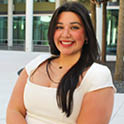
Why did you choose to major in management and human resources while also pursuing the pre-med track, and how do you envision these fields complementing each other in your career? When I decided to pursue medical school, I knew USC didn’t offer a pre-med major but instead provided a track. This allowed me to choose a major while completing the pre-requisite requirements for medical school. I wanted to select a field that would help me develop skills beyond science and build important soft skills. Management and human resources stood out as a way to enhance teamwork and interpersonal skills, which I believe are crucial for a successful career in medicine.
Why did you choose the Darla Moore School of Business? I fell in love with the University of South Carolina, and the Darla Moore School of Business sealed the deal for me. The Moore School offers a wide variety of opportunities and the flexibility to pair majors and concentrations in unique ways. I appreciated how the freshman experience introduces students to different majors before they commit to one. The Moore School’s strong reputation is well-deserved, and I’ve enjoyed every moment of being part of it. The skills I’ve developed — such as teamwork, communication and strategy — are just as applicable to a career in medicine as they are to business, especially in working with patients, families and medical professionals.”
Can you tell us about your role as a medical scribe at Prisma Health Cardiology and in the emergency department at ChartJoy? What have you learned from working in these medical settings? My role as a medical scribe in both the emergency department and cardiology has been incredibly rewarding. I’ve had the opportunity to learn from diverse health professionals, including RNs, PAs, NPs, MDs and DOs. They’ve all provided valuable insights as I navigate the path to medical school. As a scribe, I accompany physicians during patient visits and transcribe the appointments for medical records. This has taught me important skills like medical terminology, understanding medications and recognizing various diagnoses. Beyond that, I’ve gained firsthand experience in patient care and learned how to handle different types of people and situations in a hospital setting.
How has your experience in various roles, such as a medical scribe and a fulfillment team member at Target, helped you develop professionally, particularly in teamwork and communication? Working at Target during high school taught me the importance of teamwork and being part of a larger group. Starting during the busy holiday season showed me how effective teamwork can make a significant difference. As a medical scribe, I collaborate closely with physicians to ensure accurate transcription of medical records. This role has highlighted the importance of clear communication within a medical setting, not just between scribes and physicians but also among the broader team of nurses and providers. Both experiences have equipped me with skills I’ll carry throughout my career.
Reflecting on your roles outside the classroom, what challenges have you faced, and how did you grow from them? The biggest challenge has been managing my time between classes, work and personal life. I chose to work full time at two jobs while taking a full course load, which required me to find a balance. Building a strong support system of friends and family helped me navigate this process. I also learned the importance of taking time for myself to enjoy college beyond just preparing for the future.
What project or responsibility in your role as a medical scribe or during your time at Target are you most proud of, and why? In both roles, I’ve had the chance to train new employees, which I find incredibly fulfilling. Helping new team members transition into their roles and watching them succeed is rewarding. Knowing that my managers and coworkers trust me to mentor others reassures me that I’m putting forth my best effort.
How do you see your studies and experiences at the Moore School, as well as your work in health care, preparing you for your future career? My time at the Moore School and my work in health care have been instrumental in shaping who I am today. Over the past 3½ years, I’ve experienced significant personal and professional growth. The courses, the people I’ve met and the opportunities I’ve had have all contributed to my development. The Moore School taught me how to plan ahead and leverage resources effectively. My roles in health care have given me invaluable firsthand experience and skills that I’ll carry into medical school and beyond.
What advice would you give to students interested in combining business studies with a focus on health care or pre-med studies? Combining two distinct areas of study can feel overwhelming, but it’s important to focus on what each brings to your future. Take advantage of opportunities from both disciplines, even if they don’t seem directly related to your end goal. Where one area might lack, the other can fill in the gaps. Flexibility is also key — things won’t always go as planned, but adapting to change will help you succeed.
Do you have a job or medical school lined up yet? I’m taking a gap year after graduation to focus on studying for the MCAT and applying to medical school. During this time, I’ll continue working as a medical scribe at Prisma Health Cardiology and MUSC Emergency Department.
Where do you see yourself in 5-10 years, and what are some of your long-term career goals? In 5-10 years, I hope to be in the midst of a residency program for a specialty that I’m passionate about.
Q&As with graduate students
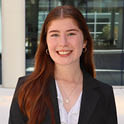
What you learned about yourself as a Moore School student: I have learned that I can do almost anything I set my mind to. While I haven’t been exposed to everything I will face in my future, I know that I am going to begin my professional career with the accounting knowledge and interpersonal skills that will allow me to succeed in any scenario.
Favorite memory: My favorite memory from the program was our formal in the spring. It was an opportunity for everyone in the program and faculty to get together at a local bar and reminisce on the year. All the students hung out afterwards, and it was a great end to the year.
Advice for incoming students: My best advice would be to fully commit yourself both academically and socially. This program is just as much about the skills you are learning as it is about the network you are building. Be careful not to miss out on developing personal connections with faculty and other students in the program in the name of academics. The people I have met along the way are by far my favorite part of the program and what I have found to be the most fulfilling.
What’s next: I currently have a job lined up as an audit associate at the KPMG Greenville, South Carolina, Office.
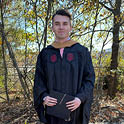
What did you learn about yourself as a Moore School student? I learned that no task is impossible with God by my side.
Favorite memory? Associate professor Chad Stefaniak’s Accounting Research and Communication class challenged us with tough, yet exciting, presentations, making the experience both engaging and rewarding. Over the semester, our group bonded deeply through collaborative projects and in-class presentations. His class not only strengthened our skills but also fostered long-term relationships that I’ll value for years to come.
Advice for incoming students? For students considering a Master of Accountancy, my advice is to focus on developing both technical skills and a strong professional network. Embrace opportunities to learn emerging technologies like data analytics and systems controls, as these are increasingly important in the field. At the same time, actively connect with peers, professors and industry professionals — these relationships can open doors and provide invaluable guidance. Lastly, stay adaptable and curious; the accounting profession is evolving rapidly, and a willingness to grow with it will set you apart.
What’s next? I accepted a job with Forvis Mazars in Greenville, South Carolina, with their audit practice.
